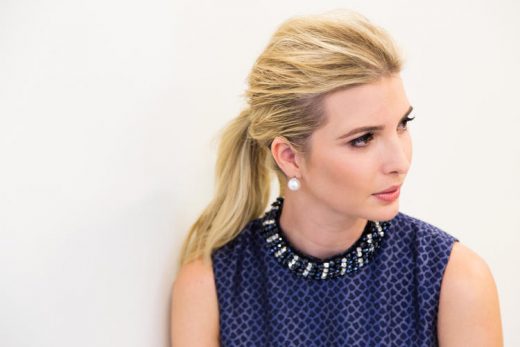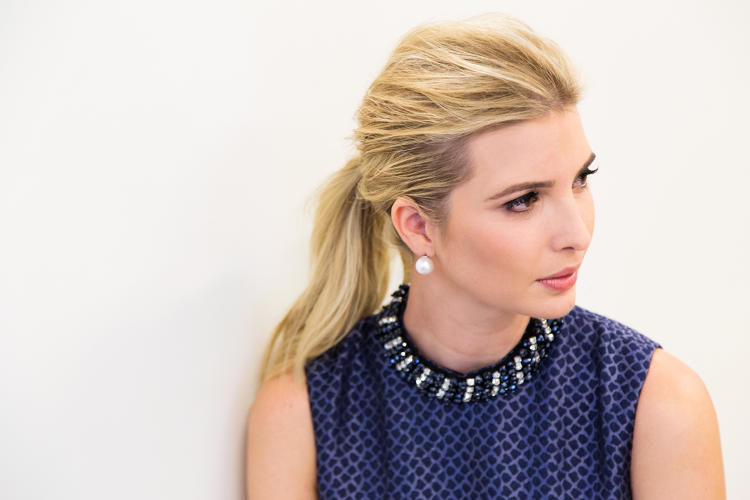Ivanka Trump Doesn’t Flinch
The energy on the 22nd floor of Trump Tower becomes a little giddier when Ivanka Trump enters the small offices that serve as headquarters for the Ivanka Trump collection. It’s my third visit to the licensed apparel and accessories company since August, and Ivanka seems looser than she has appeared in recent TV interviews, laughing with her staff and double-checking her makeup and teeth before her photo shoot, gamely allowing our photographer to perch her all over the office in search of the best light.
As the initial excitement around her arrival subsides, the staff get back to work. I watch Ivanka as she follows my colleague’s instructions from behind the camera. A former model, Ivanka resets her face between shots, momentarily erasing her expression in preparation for her next pose. After the shoot, she calls out to one of her employees to fetch her coffee cup (“I really need it today!” she laughs—she just got back from picking up one of her kids from a short day at school), then resets herself again and sits across from me at a small white conference table, lowering her voice both in volume and pitch. Even her face becomes a little less expressive—not less pleasant, but a little harder to read.
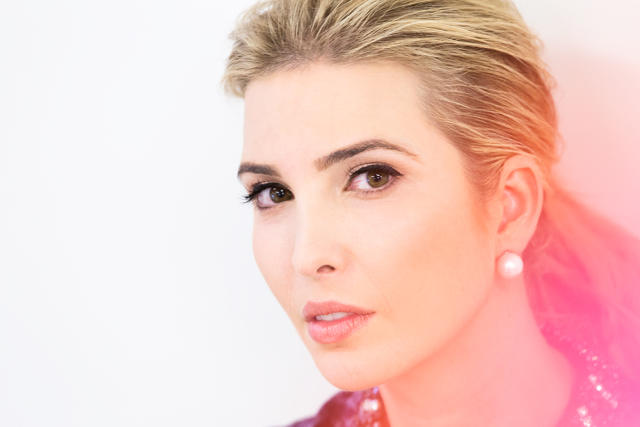
“I learned a long time ago that I can’t control the opinions of others or what they project on me. All I can do is live my life, and I’ve tried to do that,” she tells me a few minutes into our interview. It’s a classic Ivanka statement, as if to say, I’m perfectly clear about who I am; it’s not my fault what other people decide to think. It’s easy to understand why she feels that way, and why Ivanka—always poised, always on message—seems to work so hard to keep her image under control.
Now 34, she has been in the limelight since she was a child, thanks in part to the soap opera of her wealthy parents’ lives (her mother is former competitive skier and model Ivana Trump). And at the moment her father, Republican nominee Donald Trump, is running arguably the most controversial bid for the White House in American history. For the most part, she has managed to support her father’s campaign, co-run The Trump Organization, and lead her own Ivanka Trump brand through the resulting noise. Her ability to engineer—and perhaps neutralize—her image is a skill that has served her well over the course of this year’s presidential campaign, during which she has testified on behalf of her father, or at least stood sentry by him, numerous times.
“I mean, it’s been a year and a half of enormous scrutiny, of my family, every business, every movement, action,” Ivanka concedes. “But I think that, you know, that sort of comes with the territory. And I think I’ve probably learned a lot through it and I’ve probably grown a bit tougher in terms of my resilience toward what is thrown our way because, you know, I’ve read some very negative stuff,” she says, laughing a little, and sighing.
Sometimes the stuff that gets reported isn’t just negative, I point out; it’s actually shocking. For example, how does one wake up, read in the newspaper that your father is accused of sexually assaulting a minor, and continue to go about your day?
Ivanka doesn’t flinch. “The greatest comfort I have is the fact that I know my father. Most of the people who write about him don’t. I do,” she says matter-of-factly. “So that gives me an ability to shrug off the things that I read about him that are wrong,”
But nothing compares to the uproar directed at Donald Trump this month.
First there was the leaked recording of Trump boasting about groping women, followed by a string of women coming forward to accuse him of sexual abuse. Public pressure on Ivanka has gone into overdrive.
Two weeks after our final interview, I reached out to Ivanka’s publicist to get her reaction to the now-infamous 2005 recording of Donald Trump boasting about what amounted to sexual assault. “My father’s comments were clearly inappropriate and offensive and I’m glad that he acknowledged this fact with an immediate apology to my family and the American people,” Ivanka responded in a statement to Fast Company.
Rarely has Ivanka conceded any wrongdoing by her father. In the past, Ivanka has responded to sexism accusations against her father by calling him “an equal opportunity offender” who has “said plenty of rough things about men over the years.” (Her father, for his part, blames the recent wave of accusations on a media conspiracy hell bent on keeping him out of the White House.)
Ivanka is not naive to sexism when she sees it; at one point in our conversation, when I mention that she has been referred to by the press as Trump’s “surrogate wife,” she cuts me off a little: “Which is deeply offensive. I feel that that’s a very sexist thing to say.” Meanwhile, the media continues to analyze her father’s comments on her physique over the years.
“This has been a surreal experience for me,” Ivanka says, straight-backed in her chair, long neck slightly bent toward me as she describes the year and half since she helped introduce her father’s candidacy. Often, when Ivanka says something even remotely not-positive about the campaign, she adds a bright side to her statement: “And it’s been an amazing one, and I’ve learned so much.” Ivanka smiles when she speaks; she rarely breaks eye contact with me, unless there is some movement in the room—when I move my finger down my iPhone screen to scan my questions, I see her briefly glance at my hand before locking eyes with me again.
Many in the public—and the media—are obsessed with figuring her out, convinced that she secretly doesn’t agree with her father’s policies, eager for her to finally show her hand. “I mean, I think that Ivanka has a really thick skin,” says Abigail Klem, head of brand at Ivanka Trump. “And one would have, if you’ve grown up in the public eye the way that she has.”
Ivanka has built her business on a brand platform that champions working women, so why is calm, polite Ivanka supporting an unpredictable and combative candidate so many professional woman have accused of sexual harassment, they wonder? Is the root of her loyalty pure filial duty? Does she support him because he’s rich (though how rich is anyone’s guess?) Because she suffers from a form of Stockholm Syndrome? Because the exposure is good for her business? Because deep down, she’s actually just like him? Because of her stated reason: that she truly believes he’s the best man for the job? Those who question Ivanka’s motives may as well stop holding their breath; this is a woman who, in her 20s, wrote an entire book loosely around the theme of holding one’s “Trump” card close to one’s chest until it’s really needed.
Business And Politics
One thing that’s become clear is that the Ivanka Trump collection has benefitted from all the attention. Ivanka’s appearances on the campaign trail, and in the audience at presidential debates, have doubled as free marketing. The Ivanka Trump collection dress she wore to the Republican National Convention quickly sold out, and working women’s issues—the only area in which she has publicly gotten involved with the policies of her father’s campaign—are core to her business’s branding strategy. Her company caters to working women (and full-time moms) age 25 to 34 under the banner of the company’s tagline “Women Who Work.”
Net sales of just the clothing arm of the company were up $11.8 million during the first 6 months of 2016 compared to the first 6 months of 2015 as it sold its products online and at department stores, according to public filings from one of Ivanka Trump’s major licensing and manufacturing partners. Forbes reported that Ivanka’s clothing line generated $100 million in revenue last year, and sales were up $29.4 million from the previous fiscal year. The private company will not confirm specific sales figures, but do say their sales went up 37% last year, and that the growth rate has held pretty steady this year. And the website‘s traffic is up 50% over last year, thanks in large part to Ivanka’s heightened public profile.
The flip side to the success has been a public dissection of her business and personal stance on issues like maternity leave and childcare anytime she stumps for her father. While publicizing Trump’s maternity leave and childcare plans, Ivanka claimed his opponent, Hillary Clinton, hadn’t come out with a plan of her own (she had). Ivanka also claimed that The Trump Organization offers all employees paid maternity leave (they don’t). The 20-odd people who work full time for Ivanka Trump, however, do get eight weeks of paid maternity leave. At least one of Ivanka Trump’s major licensing and manufacturing partners, G-III Apparel Group, doesn’t offer its employees any paid maternity leave at all—but she tells me she doesn’t have any plans to end Ivanka Trump Collection’s relationship with G-III anytime soon.
“I don’t own that company, I don’t control that company,” Ivanka says of G-III during our second interview, a phone call as she travels between campaign events in Colorado. “I do control my own business practices and that’s why I’ve chosen to offer an industry-leading eight weeks of paid leave, but obviously I can’t control the practices of everyone in the universe I do business with.”
Her company is one of just 10% of American businesses that currently offer paid maternity leave. And while Ivanka Trump doesn’t offer childcare assistance to its staff (not that such a perk is common anywhere in America), several top-level Ivanka Trump employees with kids say the company is working parent friendly. Editorial director Sarah Warren was allowed to keep her job and work remotely from New Mexico after her husband was transferred to Albuquerque; head of brand Abigail Klem points to the company’s flexible work schedule and vacation policy as crucial to her life as a single, working mom.
At least one former employee claims her experience at the company was very different. On Facebook, Marissa Velez Kraxberger, now vice president of creative at Rag & Bone, recently wrote about her experience as the chief marketing officer at Ivanka Trump, a position she left in 2015 after two years at the brand. Kraxberger, who did not respond to requests to comment for this story, claims that paid maternity leave was not originally Ivanka’s idea at all. She writes:
[. . .] when I recently saw a commercial with Ivanka and her father and their “maternity leave” policy I felt like I was going to be ill. When I first interviewed with Ivanka I was 2 months pregnant, she called to offer me a job, which I was at the time very excited about, and when I asked about maternity leave she said she would have to think about it, that at Trump they don’t offer maternity leave and that she went back to work just a week after having her first child. I somehow was dumb enough to accept the job after agreeing upon having the discussion further down the road about how we would handle the time after my baby was born. Our team—the ones who created #WomenWhoWork and the ones who the hashtag really stood for—fought long and hard to get her to finally agree to 8 weeks paid maternity leave.
In a statement, an Ivanka Trump spokesperson told Jezebel that Kraxberger’s version of events is a “mischaracterization of how our company developed its industry leading culture and benefits package.”
A noteworthy part of Kraxberger’s version of events is her claim that Ivanka said she had gone back to work just a week after her first child was born; it’s notable because Ivanka is aware of the power of leading by example. In The Trump Card, the business memoir Ivanka wrote back in 2009, she expresses admiration for her friend Rupert Murdoch’s habit of visiting the Wall Street Journal newsroom on Sundays (Murdoch owns the paper). Ivanka emulated the practice herself at The Trump Organization, writing “you’d be surprised by how quickly your employees will fall in line behind you when you set this kind of example.”
I remind Ivanka that her own mother went back to work just two days after giving birth to Ivanka’s elder brother, Donald Jr., and that Ivanka herself appeared on stage with journalist Gayle King just six weeks after giving birth to her third child. Since her father’s childcare policy has been criticized for, among other things, not extending benefits to fathers or same-sex partners, I ask: Isn’t paternity leave good for ambitious women? Trump responds that her father’s plan isn’t the final step, but a first step.
“Right now, under U.S. law, there is no paid leave,” Ivanka points out. Donald Trump’s plan, she says, “represents a very positive step in the right direction.”
One thing Ivanka has been adamant about throughout this wild year is that “it’s always been very important for me to separate business from politics”—and her staff echo this sentiment. In public and away from her company, for much of the election season, Ivanka has acted more like her father’s character witness than a policy maker, though it has long been reported that she is one of her father’s most trusted advisors on his campaign. Use the word “advisor” in front of Ivanka, however, and she will quickly correct you. “I am a daughter and an executive who has worked alongside him,” she tells me.
But in the eyes of her potential customers, the line between presidential campaign values and Ivanka Trump values may seem more blurred than Ivanka and her employees will ever concede. The Ivanka Trump website is mostly dedicated to life and career advice, and readers are more likely to find an article filled with salary negotiation advice than a post about sexual harassment in the workplace. It has featured photographs of Ivanka wearing Ivanka Trump-label clothing at Trump campaign events in the “From Ivanka’s Desk” section of the website, as well as her endorsement of her father’s maternity and childcare platform which Trump himself has implied she helped influence. (“‘Daddy, daddy, we have to do this,'” Trump said at an Iowa campaign event, caricaturing Ivanka. “She is the one that has been pushing so hard for it.”)
“Our site traffic is through the roof, our emails . . . when you look at the numbers, you couldn’t pay for this visibility,” says editorial director Warren. The company’s newsletter database is up 275% over last year, Warren reports. The site focuses on creating what Warren calls “short, snackable,” and “actionable” content (“6 Tips for Talking to Your Kids About Money”; “7 Off Duty Habits That’ll Make You Smarter”) and includes creative touches like print-out guides readers can take with them to, say, job interviews, which are actually pretty handy. This editorial-first approach—also favored by another celebrity-driven brand, Gwyneth Paltrow’s Goop—does help set Ivanka Trump apart from other businesses that hawk work-appropriate clothing at working women, like Ann Taylor.
There are articles on the site featuring a range of thought leaders, ranging from MacArthur Grant recipients to startup founders. But some participants have expressed their discomfort at being featured on the site; Glossier CEO Emily Weiss recently tweeted regret over a Q&A published on IvankaTrump.com, writing “it’s culled from an old interview; I wouldn’t do it today.” (Weiss did not respond to a request for comment on this story.)
“Since the beginning of the process, we’ve kind of draw n an Iron Curtain more or less between the brand and the politics,” says Warren. “I don’t even know the political affiliation of most of the women on our site because that’s definitely not what it’s about.” She does, however, draw the line at including Hillary Clinton on the site. “Right now, I wouldn’t,” she says. “I think it would be distracting. I think that that would be featuring someone to make a political statement. Would I feature her down the road? Maybe. But right now, we want to be creating content that is more than just click bait and we want to be encouraging conversations that are about topics beyond politics, that are about bettering yourself as it pertains to your career and to architecting a life that you want to live—and right now, I think it would probably do more harm than good.”
Far from campaign podiums, Ivanka Trump’s staff insist they don’t talk politics among themselves in the office. “When I brought together my team, I didn’t ask what their political orientation was, nor do I care,” Ivanka tells me emphatically. It’s possible Ivanka may be the only person in her company whose presidential endorsement is fully known to the others (although a public records search reveals that there is at least one registered Democrat in the office).
“I know it might sound odd, but we really do try not to talk about the politics, because there is so much noise around it, and we really do try to stay very focused on the values of this brand and around ‘Women Who Work,’ and trying to service those women,” says head of brand Klem, a 12-year Diane von Furstenberg veteran who arrived at Ivanka Trump several years ago as its first full-time employee. “And I think it is very separate from what’s happening in the political campaign.”
But, she adds, “I will say, I can’t wait till the election is over.”

The Daughter Card
After doing some modeling as a teenager, Ivanka did a post-college stint at a real estate company, and then went to work for her father at The Trump Organization. She was anointed vice president of real estate development and acquisitions and became the youngest board member of a publicly traded company (Trump Entertainment Resorts) at the age of 24.
When Ivanka joined the cast of The Apprentice, she became even more famous. If you look closely, you can see how Ivanka has evolved over the years. “I’m sort of into sabotage,” she tells Piers Morgan in one early episode of The Apprentice, her father’s reality show. In another archival interview, Ivanka laughingly notes that she does “not pull punches…I’m on the blunt side.” But over time her mannerisms have become more controlled, her speech a bit more refined. Part of it might just be growing up.
Before she turned 30, she wrote The Trump Card and launched a fine jewelry business. A shoe line followed and she soon expanded her licensing deals to handbags, clothes, accessories, even fragrances and baby gear. She married Jared Kushner, another rich real estate developer’s kid who was no stranger to tawdry family headlines. He is now a key participant in Donald Trump’s campaign.
Through it all, Ivanka kept her public image firmly under grip, cultivating a hard-working reputation and avoiding social scandal. “People I know who’ve been in a business setting with her—a colleague or a schoolmate—have all said she is very impressive in person. She’s always well prepared, well spoken,” says Paige Arnof-Fenn, founder of branding firm Mavens & Mogul and a former vice president of Zipcar.
Brand and public relations experts generally agree that Ivanka’s role as a loyal daughter has protected her from some of the blowback from her father’s campaign.
“Ivanka’s brand has always been built on a really carefully balancing act,” says Rajiv Menon, a cultural analyst with the branding consultancy TruthCo. “She’s really demonstrated a sense of drive, a sense of ingenuity, and really established something strong with her apparel brand and larger public presence. But with all of that, she’s never really lost her sense of family loyalty,” he says, pointing out that “in the early 2000s, when she was featured in that documentary Born Rich, she was really public about her love of her family, her pride in her family, and reaffirming the Trump name quite often,” Menon says. “And as the campaign has continued, she’s maintained that balancing act—but as the campaign has also mutated and turned into what we see now with the tape that was released on [October14], that balancing act becomes a lot more precarious. It becomes much more of a liability for her.”
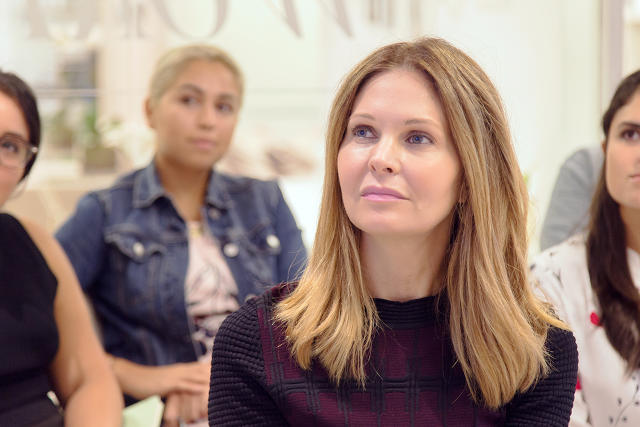
Still, in the eyes of the public, “any child or parent is going to to defend their parent or their child,” says leadership consultant Gregg Ward. “That’s her right.”
“She would lose points if she didn’t stand by her father,” says Pace University professor of marketing Larry Chiagouris.
Others argue that family loyalty does not excuse Ivanka’s defense of her father’s behavior.
“She wants to be the brand of glamorous millennials,” conservative blogger (and ardent Donald Trump critic) Jennifer Rubin writes me in an email. “But what young woman wants to be reminded every time she puts on a pair of Ivanka shoes of her father boasting about sexual assault?”
The fact that her father’s campaign has been accused of racism, or enabling racism, on multiple occasions certainly hasn’t made things easier for Ivanka, as tough as she may be. After Ivanka introduced Donald Trump at the RNC as “colorblind and gender neutral,” critics felt her comments simply highlighted how out of touch she is on the issue. It’s well-documented that some of the supporters at Donald Trump rallies have been self-proclaimed white nationalists.
“In terms of what you just mentioned,” Ivanka tells me, “I categorically reject any people within a community that espouses hatred toward anyone, and my father does and has as well, so this is not support that I would be comfortable with. And I couldn’t be comfortable with my father as president of this country if I thought that he could be comfortable with that type of support, and I know that he is not, that’s why he’s denounced it.”
Christina Brown, who runs a fashion and beauty blog for women of color called Love Brown Sugar, says she will not feature Ivanka Trump products on her platform. “Most of the products that I feature on my site, I want to make sure the messaging behind those products and also the people behind the products are people that I align with. I personally do not align with the presidential candidate Trump, and so I would never personally endorse anything that they promote,” she says.
Yet calls on Twitter for boycotts of Ivanka’s brand don’t seem to hurt her business. “Not only can her brand transcend it, but the more people say they’re going to boycott her brand, the more they’re going to drive [those] who are either middle of the road or pro-Republican to choose the brand,” says Pace University’s Chiagouris. Ivanka Trump’s major retail partners, including Bloomingdales, Zappos, Amazon, Dillard’s, Nieman Marcus, Macy’s, Lord & Taylor, and Nordstrom show no signs of discontinuing their affiliation.
“If everyone who votes for Trump buys her products, she’d be the wealthiest, most important fashion brand in the world,” adds Chiagouris. “Think about that . . . Those Twitter people? She doesn’t need their business.”
After Ivanka’s speech at the Republican National Convention, even ardent anti-Trumpers like the actress and activist Mia Farrow tweeted “When is Ivanka running for President?” A summer Gallup poll found that Ivanka’s favorability rating was about on par with that of Hillary’s Clinton’s daughter, though Ivanka seems to generate far more public interest than her friend Chelsea, if Google searches are anything to go by. Ivanka has even been touted by various people (including Donald Trump) as a possible future Trump administration cabinet member.
“No, I don’t intend to be part of the government,” she tells me.
Life After November 8
As the two presidential candidates’ campaigns flail aggressively toward Election Day, Ivanka is busy with far more than just campaigning. After all, Ivanka still has two businesses to run, and three kids under the age of 5 to raise (not without help, of course). She’s also releasing a new book in the spring called, unsurprisingly, Women Who Work with editorial director Warren; the Ivanka Trump offices are soon moving to a bigger space in Trump Tower, and the company has more partners and more retail deals in the works. In 2017, Ivanka Trump Collection products will be available in over 1,000 stores. After months of mud-slinging and dark revelations on both sides of the political aisle, it’s possible Ivanka might be one of the biggest winners of the 2016 election.
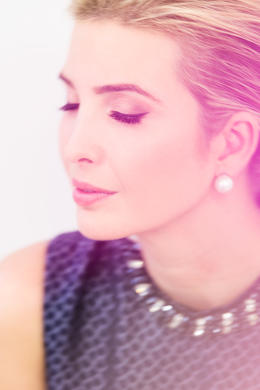
“She may come out ahead,” says Chiagouris, because “six months from now, whether Trump’s the president or not, I think people will hold her in higher regard than they would have held her six months ago.”
The longer-term challenge for her brand, between her wealth and her tightly controlled self-image, is whether she’s relatable enough. Through all the stress of the past year, Trump has come off as poised, unflappable, and strictly on message. The Ivanka Trump website is littered with photos of Trump doing something professional—cutting a ribbon on a new Trump property, say, or donning a hard hat—while wearing a crisp dress and rocking flawless hair (on social media, she’s a bit more likely to be seen make-up free while caring for a baby).
“One of the things that I would love to see Ivanka do, and we try to showcase a little bit more on our site, is to show the more human, funny side of Ivanka,” Klem, her head of brand, tells me. “She’s grown up in the public eye, so she is poised all of the time or certainly all of the time where she’s being interviewed and all that . . . so we’re trying to get Ivanka to showcase a more sort of silly side of herself. We’ll see if that happens,” Klem says. “I have encouraged her to highlight the times when things aren’t so easy for her or when she felt that she failed.”
Let’s say Ivanka did do that—talk about the harder moments in her life. Would many people sympathize with a billionaire’s daughter? There’s a moment in The Trump Card when she recalls wishing, when she was a little girl, that she were like everyone else. Her parents’ divorce was front-page fodder for New York tabloids, and photographers often hounded young Ivanka as she walked to the posh Chapin School. A reporter once asked nine-year-old Ivanka if relations with her father had really been, as a New York Post headline declared, the “best sex” his then-new girlfriend Marla Maples had ever had. “What type of person would ask a 9-year-old girl that kind of question? About her own father, no less?” Ivanka wrote in the book.
“From time to time,” she wrote, “my sideline interests collided head-on with my parents’ desire to provide as much as possible for their children. And somewhere in the pileup was whatever was left of my desire to have a normal childhood. That was always a big deal to me when I was little, to be just like everyone else, the kids whose parents weren’t being written about in the tabloids—but, alas, normal wasn’t always possible. Not in our house.”
The last question I ask Ivanka is whether she has felt that childhood desire, to be like everyone else, since her father’s campaign began and the tabloid coverage has kicked into high gear again.
“It’s interesting, because anonymity is a very valuable thing. Sometimes, obviously, I wish I—there’s tremendous amount of pressure in having your family member run for the highest elected office in the country, arguably the world,” she acknowledges. “But visibility to create change and positive change for this country, if [Donald Trump is] elected, is worth any of the other personal challenges that come with the presidential campaign.”
She’s made it this far, but it’s anybody’s guess what will happen after November 8. “It was Donald Trump that got her here today, but it’s not necessarily going to be Donald Trump that gets her to the next level in a year and five years from today,” says Chiagouris.
In the meantime, don’t expect you’ll ever have Ivanka totally figured out. “Perception is more important than reality,” she writes in The Trump Card. “If someone perceives something to be true, it is more important than if it is in fact true. Let the other guy think what he wants. This doesn’t mean you should be duplicitous or deceitful, but don’t go out of your way to correct a false assumption if it plays to your advantage.”
related video: From crises to commercials
“When I brought together my team, I didn’t ask what their political orientation was, nor do I care,” says Ivanka.
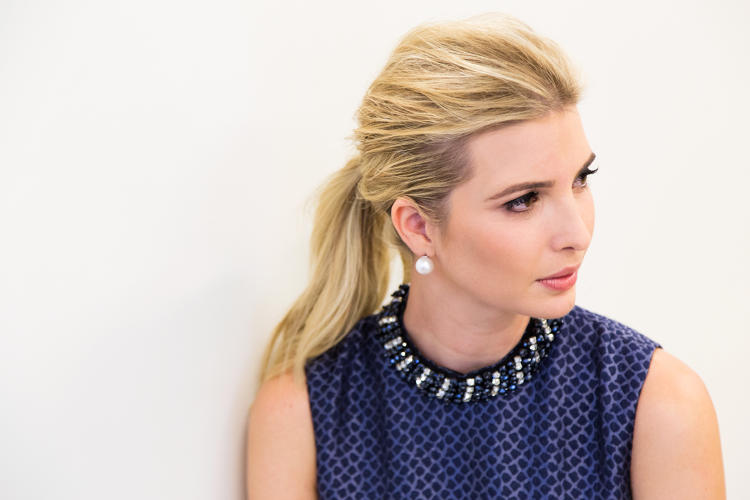
Ivanka Trump HQ in Trump Tower.

The entrance to the Ivanka Trump offices.
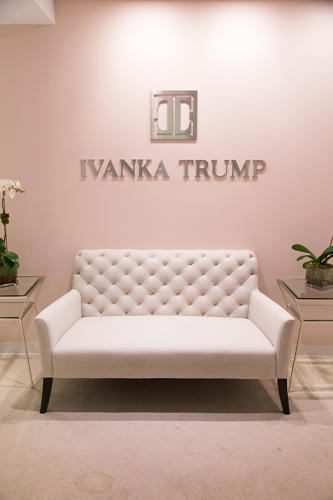
#WomenWhoWork is the brand’s foundation, focused on empowering working women (and full-time moms).
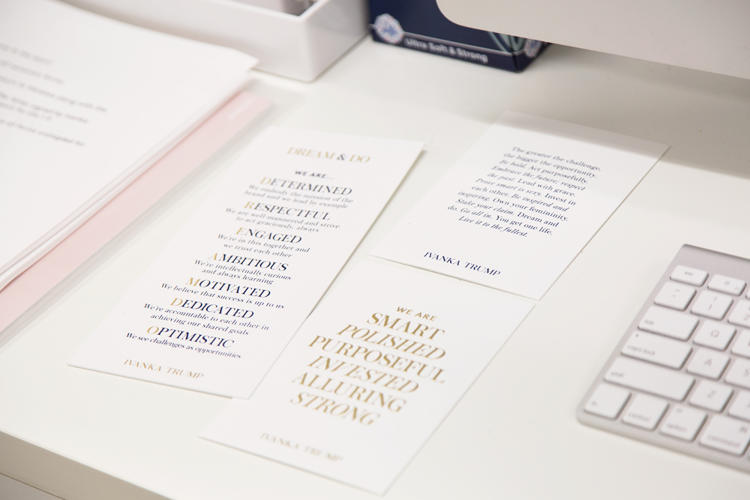
The Ivanka Trump offices.

The Ivanka Trump offices.
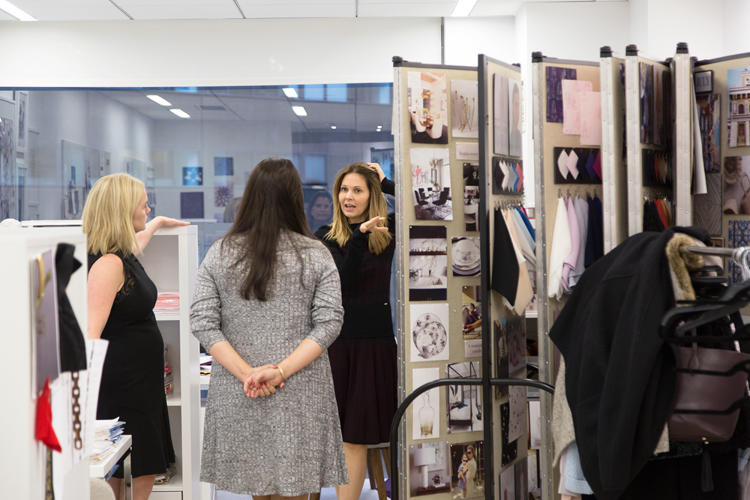
A team meeting in the Ivanka Trump offices.

“Women who work, work at their lives,” says head of brand Abigail Klem.
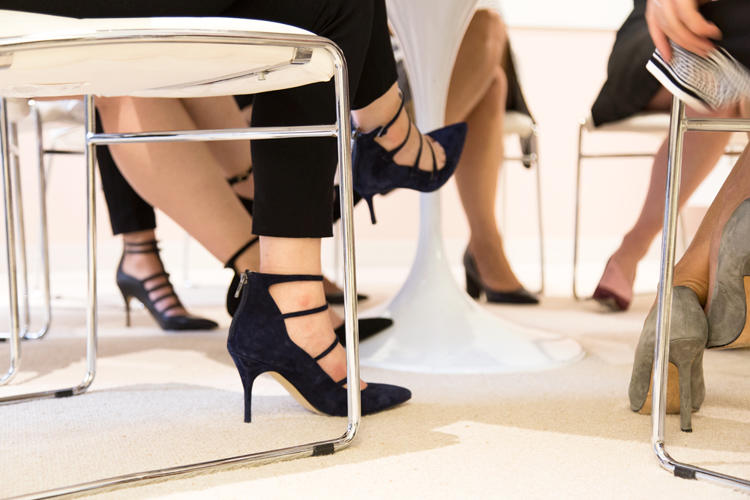
The company recently launched its fall #WomenWhoWork campaign.
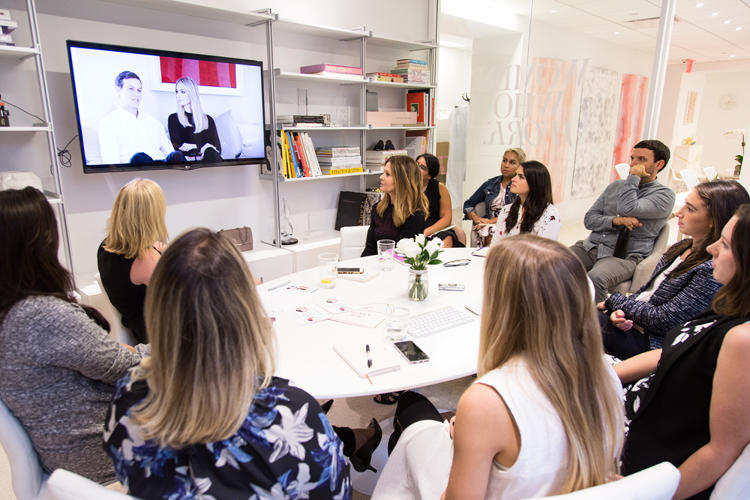
Head of brand Abigail Klem.
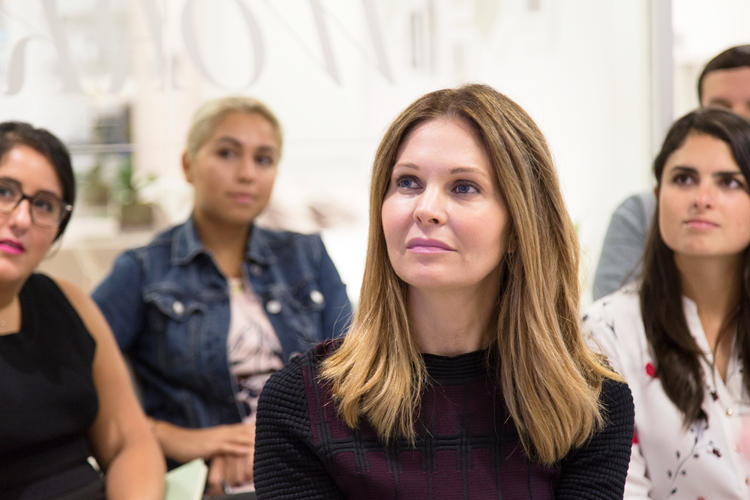
Ivanka Trump.
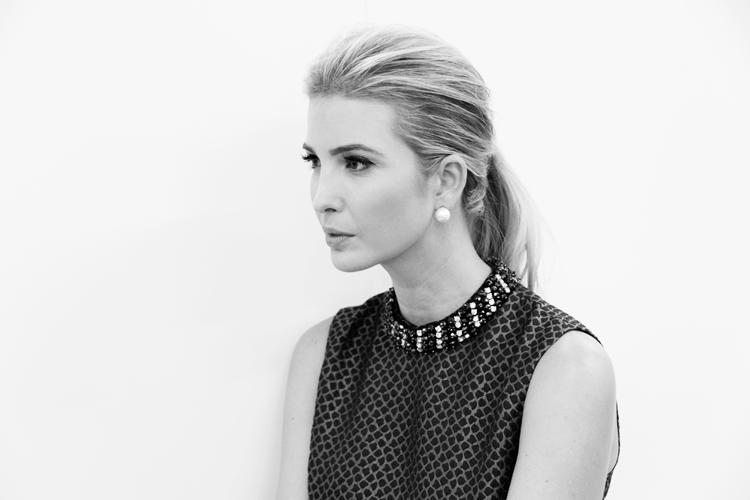
Fast Company , Read Full Story
(220)

